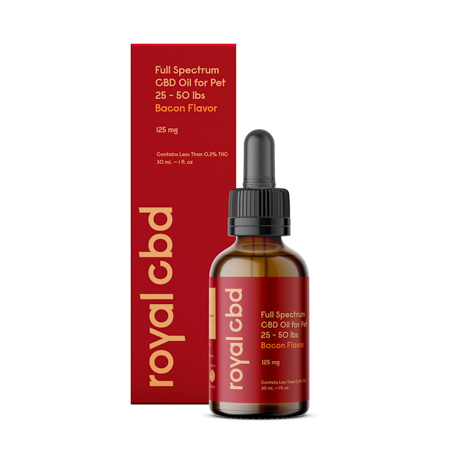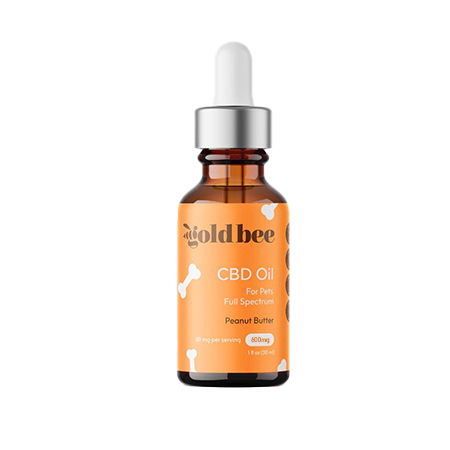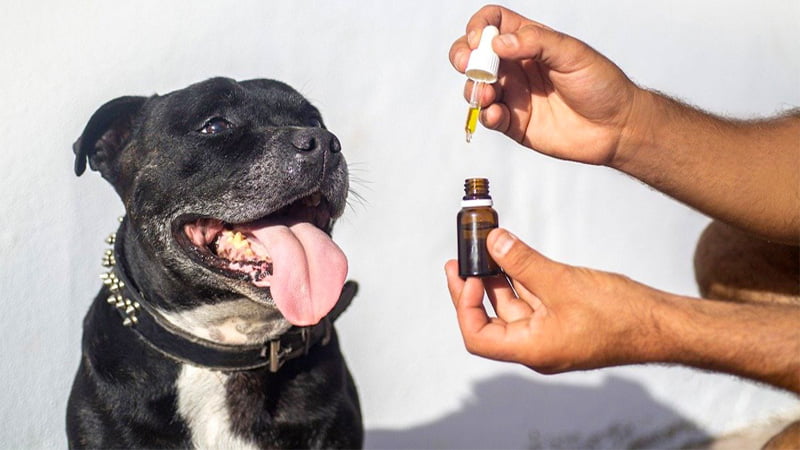Best CBD Oil for Dog with Allergies (2023 Buying Guide)

Few situations are more saddening for dog parents than watching their four-legged friends itch, whine, and pace around in discomfort. But once you understand the possible reason behind such behavior, you’ll be able to act accordingly.
The above symptoms usually indicate skin allergies, which require a diagnosis from a veterinarian.
Unfortunately, most allergy treatments recommended by vets are either ineffective or come with severe adverse effects when used long-term.
Some of these medications can cause secondary infections, further deteriorating your dog’s situation.
It’s no wonder dog parents are looking for a safe and effective alternative to conventional meds.
Recently, CBD has come into the spotlight as a potential remedy for dogs with allergies symptoms and their causes.
In this article, I’ll show you the best CBD oils for your dog, explore the types of allergies and shed more light on the problem of allergies and intolerances in our canine companions.
Best CBD Oil for Dog Allergies: My Top Picks for 2023
I always follow strict quality criteria when picking out CBD oils for my lists. They’re based on safety, quality, and transparency. Both companies — Royal CBD and Gold Bee — have been tested for the following:
- Certificates of analysis from an ISO 17025-compliant laboratory
- The source of hemp (grown in the USA)
- THC content (0.3% or less, according to the 2018 farm bill)
- Purity (no pesticides, herbicides, heavy metals, solvents, or mycotoxins)
When I was doing my research for this article, I also considered:
- The company’s production practices and certifications
- CBD potency
- Additional ingredients that could strengthen the immune system
Last but not least, I took into account:
- Customer reviews
- Whether the company is facing any lawsuits for mislabeling its products or presenting unsupported health claims
- Whether the company has ever been subject to a warning letter from the Food and Drug Administration.
Below I share my favorite picks:
1. Royal CBD
| Pros | Cons |
|
|
Royal CBD is a Las Vegas-based company that specializes in organic CBD products for dogs from full-spectrum and broad-spectrum extracts. After succeeding with its line of CBD for humans, the brand has recently introduced a special selection for pets, including CBD dog treats for your pet.
The Royal CBD pet oil comes in two strengths: 250 mg and 500 mg, which you can choose according to your dog’s weight and the severity of allergy symptoms. This is a full-spectrum extract, so your dog will benefit from the synergistic effects of cannabinoids and terpenes.
If your companion fusses over the flavor o natural CBD oil, these bacon-flavored drops should change its mind. Royal CBD also tests its products in a third-party laboratory for potency and purity, so these products are not only tasty and effective but also safe.
2. Gold Bee
| Pros | Cons |
|
|
Gold Bee is the best brand if you’re looking for all-organic CBD products infused with superfoods such as honey or organic coconut oil.
Like Royal CBD, Gold Bee uses the same premium-quality hemp extract in its dog line as it does in its collection for humans. The only difference is the dose, which the company decreased based on different weight groups.
The Gold Bee CBD pet oil comes in only one concentration (600 mg). While this is great for medium-sized and large dogs, smaller breeds or miniature dogs may have problems receiving the right dose from the start.
But one thing is for sure — they’ll lick the hell out of the dropper thanks to this delicious peanut butter flavor. At least that’s what my Ricko has done.
What Are Dog Allergies?
Dog allergies are reactions of the canine immune system to foreign substances that would otherwise be considered benign. But, in an allergic dog, they can trigger an array of unpleasant reactions.
Dog allergies can take many forms that can be dangerous for your friend’s health in the long-term perspective.
Different Types of Allergies for Dogs
Although all allergies share some common symptoms, there are different forms of dog allergies that you should be aware of.
Flea Allergy Dermatitis
This type of dog allergy occurs when your dog gets bitten by fleas. These little insects feed off the dog’s blood and their bites result in itching throughout the body, especially between the lower back and tail-base area.
Fleas usually attack the ears, abdomen, and lower back of your dog. Detecting the infection can prevent the spread of secondary infections and other diseases, such as tapeworms and anemia.
Always monitor your dog’s behavior if you suspect it could have flea allergy dermatitis.
Food Allergies
Food allergies are caused by food intolerances, which are adverse reactions to an offensive ingredient in your dog’s food.
Dogs respond differently to food. A food allergy can range from hives and itchiness to facial swelling, sneezing, and droopy eyes.
On top of that, your dog may suffer from a stomach upset, and experience nausea and diarrhea. Dermatological issues like a dull coat, itchiness, pale skin, and foot infections may also develop as a result of a food allergy.
Fortunately, food allergies are less common in dogs than in humans.
Environmental Allergies
Dogs generally love to play out in the open. While physical activity and fresh air are generally a blessing for your dog’s well-being, they also increase its exposure to environmental allergens.
If your dog experiences discomfort after rolling on the ground or grass, such as itching, irritation, or swelling, this may be caused by the said allergens.
Runny eyes and frequent sneezing are the other common signs of environmental allergies.
Acute Allergies
Although most allergies are mild, and some may even go unnoticed, acute allergies can be extremely disturbing for your dog’s comfort. Some of them can even be life-threatening.
For example, bee stings and certain vaccines can cause extremely dangerous reactions like anaphylactic shock, which can be fatal for the dog. That’s why it’s so important to protect your dog against getting in contact with acute allergens.
Possible Symptoms of Allergies in Dogs
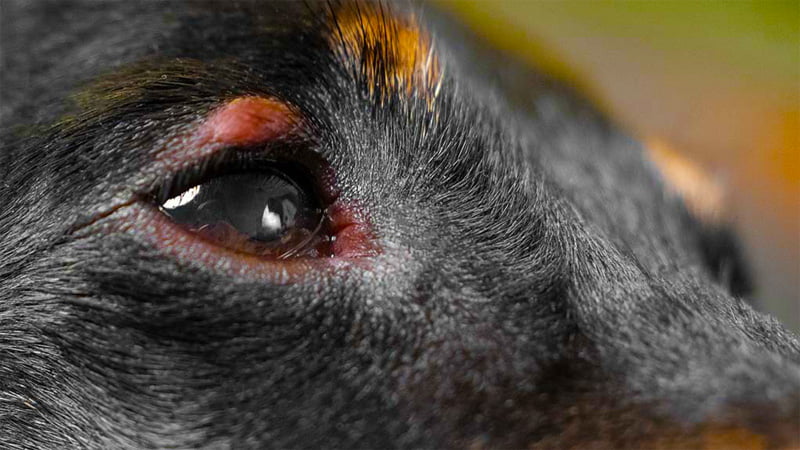
Symptoms of canine allergies vary depending on the allergen. However, the initial symptoms are almost always the same, including:
- Droopy eyes
- Runny nose
- Sneezing
- Loss of appetite
- Inflammation
- Itchy skin
- Nausea and vomiting
- Swelling around the ears or eyes
- The strange odor from the ears or skin
- Hives
- Excessive licking or itching of the affected area on the skin
How CBD Oil Can Potentially Help With Allergies
CBD modulates the activity of the endocannabinoid system (ECS) to help your dog manage allergies and symptoms. The ECS is made of three components: cannabinoid receptors, endocannabinoids, and enzymes.
Type 1 cannabinoid receptors (CB1) are mostly found in the brain and central nervous system, while type 2 cannabinoid receptors (CB2) occur in the immune system and peripheral organs.
The immune response is mediated by the CB2 receptor — and CBD is its agonist, meaning it directly activates it.
There are three major areas where CBD could help with dog allergies.
CBD for Allergy-induced Pain
Dog skin allergy often entails pain inflicted by excessive scratching or biting.
CBD is a natural painkiller. It has anti-inflammatory properties and can mitigate pain signaling to the brain. This means that you can use CBD to help with any kind of pain that troubles your dog.
CBD for Immune Boost
CBD can enhance your dog’s immune function by facilitating proper communication between the cells of the immune system. This way, your dog’s immune cells can correctly identify intruders instead of attacking healthy cells.
The immunomodulatory effect of CBD on dog allergies is dose-dependent. At higher doses, CBD demonstrates a selective immunosuppressive mechanism, which can inhibit an overactive immune system and relieve allergy symptoms.
CBD for Inflammation
CBD’s interaction with CB2 receptors in the immune system can reduce inflammation, therefore curbing pain and other discomforts that bugs your dog during allergies. Although this may not be visible instantly, your dog should notice improvements within 2 weeks as CBD is leveling its cannabinoid deficiencies.
Long story short, while the immunomodulatory properties of CBD may address the underlying cause of dog allergies, its painkilling and anti-inflammatory effects may improve its well-being during the treatment.
CBD vs. THC: Which is Better for Dog Allergies?
THC is another major cannabinoid from the cannabis plant.
However, unlike CBD, THC is strongly psychoactive, so it can get your dog very high, especially since even large dogs are 2-3 times smaller than humans.
Giving dogs THC may result in something known as marijuana poisoning. The symptoms include drowsiness, confusion, episodes of agitation, anxiety, paranoia, racing heart, nausea, and vomiting.
Although some pet parents speculate that microdosing THC can be beneficial for dogs, this is a novel and very controversial area of research, so it’s better to be safe than sorry and avoid THC in your dog’s supplementation.
Is CBD Safe for Dogs with Allergies?
CBD has a very good safety profile, as established by a 2017 review of its safety and side effects.
When taken in too large amounts, it may cause a few mild effects, such as dry mouth, appetite fluctuation, sedation, fatigue, and diarrhea.
Other than that, CBD appears to be safe for dogs.
In a study conducted on 22 dogs with arthritis, CBD oil not only managed to reduce the pain in the dog’s joint but also didn’t produce any negative side effects.
According to a recent veterinary survey, vets are becoming interested in the use of CBD oil for dogs. They also confirm that no alarming side effects have been recorded involving CBD oil and canine diseases.
Look for a holistic veterinarian to receive proper guidance on the use of CBD oil in allergic dogs.
CBD Oil Recommended Dosage for Dogs With Allergies
That’s a good question.
When it comes to giving CBD oil for allergies, there are no universal dosage recommendations for dogs. There are, however, dosage guidelines outlined by the manufacturers on their product labels.
If you’re not sure where to start, follow the said instructions, starting at the low end — and slowly increasing the amount of CBD until you reach the point where your dog benefits from symptom relief without experiencing any adverse reactions.
How to Administer CBD Oil to Canines
CBD comes in many different forms, all of which may help tackle allergies from a different angle.
You can use CBD oil orally (in your dog’s mouth) or topically (on the skin) depending on the type of allergy.
Here’s a brief overview of different routes of administration:
CBD Topicals for Dog Allergies
CBD topicals are specifically formulated to address localized discomfort caused by dog allergies, such as pain, swelling, itching, and inflammation. They are available as creams, balms, roll-on sticks, salves, and lotions.
CBD Oil & Dog Treats for Allergies
Sublingual and oral forms of CBD are better if you want to help with general inflammation and support your dog’s immune system on top of helping with allergy flare-ups.
CBD oil has higher bioavailability than treats, so it can deliver more CBD in a single serving. That being said, not every dog is a fan of the earthy flavor of natural CBD oils. If that’s your dog, try giving them CBD dog treats; they come in a variety of flavors and textures to make CBD supplementation appealing to your four-legged friend.
How to Choose the Best CBD Oil for Your Dog’s Allergies
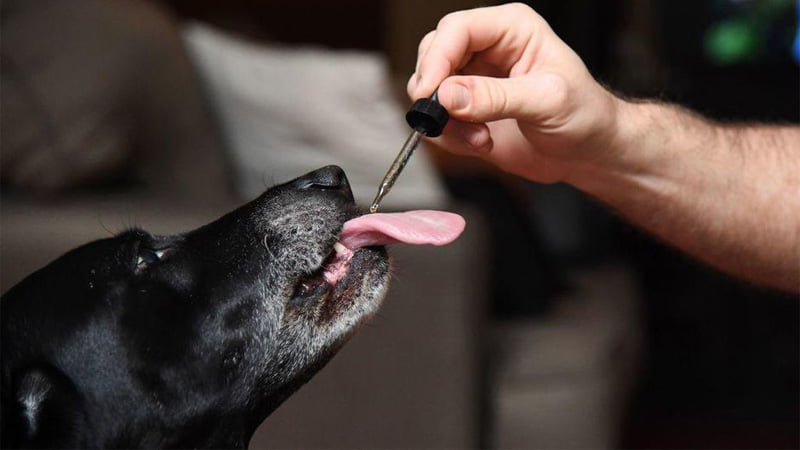
There’s a huge choice of products on the market today. However, since the market is unregulated, some CBD oils are legit while others shouldn’t even leave the manufacturing facility, not to mention being displayed on the shelves.
Follow these steps to manage your dog’s allergy without risking their safety:
- Although CBD is federally legal, individual states may put restrictions on its availability. Therefore, you should always check up on your local laws before buying any CBD product.
- For the highest quality and safety, look for CBD oils sourced from non-GMO and pesticide-free hemp.
- Ask for third-party lab reports with results for the product’s potency and purity, including pesticides, herbicides, heavy metals, and microbial impurities.
- Opt for CBD oils extracted with CO2. This technology ensures pure and potent extracts without using very high temperatures or adding hazardous solvents on the way.
- Read customer reviews before you buy CBD oil for your dog’s allergy. This will help you get a bigger picture of your vendor’s product line-up and its customer service.
Final Verdict: What’s the Best CBD Oil for Dog Allergies?
CBD is a safe and natural alternative to conventional treatments like Rimadyl for dog allergies — although it’s not the first-line resource used by vets.
For skin allergies and localized discomfort, choose CBD topicals with other supportive ingredients that can enhance the anti-inflammatory and analgesic properties of cannabidiol.
If, on the other hand, you want to boost their immune system and optimize the ECS, CBD oil or dog treats will be a better fit.
Whichever format you choose, always do solid research on any company you encounter on the Internet. The web is full of scammers — don’t fall victim to one of them. And if you feel in a rush, you can use my recommendations from this guide.
Sources:
- Silver R. J. (2019). The Endocannabinoid System of Animals. Animals: an open access journal from MDPI, 9(9), 686.https://doi.org/10.3390/ani9090686 [1]
- Russo E. B. (2008). Cannabinoids in the management of difficult to treat pain. Therapeutics and clinical risk management, 4), 245–259.https://doi.org/10.2147/tcrm.s1928
- Gamble, L. J., Boesch, J. M., Frye, C. W., Schwark, W. S., Mann, S., Wolfe, L., Brown, H., Berthelsen, E. S., & Wakshlag, J. J. (2018). Pharmacokinetics, Safety, and Clinical Efficacy of Cannabidiol Treatment in Osteoarthritic Dogs. Frontiers in veterinary science, 5, 165.https://doi.org/10.3389/fvets.2018.00165 [3]
- Kogan, L., Schoenfeld-Tacher R., Hellyer P., & Rishniw M. (2019). US Veterinarians’ Knowledge, Experience, and Perception Regarding the Use of Cannabidiol for Canine Medical Conditions. Frontiers in veterinary science, 5, 338, https://doi: 10.3389/fvets.2018.00338 [4]
- Rochfort, S., Isbel, A., Ezernieks, V., Elkins, A., Vincent, D., Deseo, M. A., & Spangenberg, G. C. (2020). Utilisation of Design of Experiments Approach to Optimise Supercritical Fluid Extraction of Medicinal Cannabis. Scientific reports, 10(1), 9124.https://doi.org/10.1038/s41598-020-66119-1 [5]
- Martínez, V., Iriondo De-Hond, A., Borrelli, F., Capasso, R., Del Castillo, M. D., & Abalo, R. (2020). Cannabidiol and Other Non-Psychoactive Cannabinoids for Prevention and Treatment of Gastrointestinal Disorders: Useful Nutraceuticals?. International journal of molecular sciences, 21(9), 3067.https://doi.org/10.3390/ijms21093067 [6]
